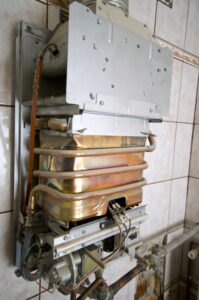
For homes that don’t have a natural gas connection, an electric furnace is one of the most common options for central heating. Even for some homes that do have natural gas, electric furnaces can offer several advantages.
But when people are shopping around for a new central heating system, they might feel confused regarding the energy efficiency of furnaces. The trick is that the efficiency ratings for electric furnaces look different compared to gas furnaces, even though they use the same measurement: annual fuel utilization efficiency, or AFUE.
We’ll explain below how to understand the AFUE of an electric furnace vs. that of other types of furnaces (including gas, propane, and oil).
AFUE Measurement
AFUE is a percentage that tells you how much of a furnace’s fuel supply it converts directly into heating energy. For example, a standard furnace from twenty years ago might have an AFUE of 85%. This means for 100 units of fuel the furnace consumes, 85 units become heat and 15 units are lost to exhaust. It’s an easy measurement to understand: the higher the percentage, the more of the fuel you pay to use in your house gets changed into heat.
So what can you expect from AFUE ratings for today’s furnaces? In order for a natural gas furnace to receive the ENERGY STAR label from the US Department of Energy, it must have an AFUE of 95% or higher. There are many high-efficiency furnaces on the market that can score even higher, although none have 100% efficiency.
Electric furnaces, on the other hand, have AFUE ratings of 100%. In fact, 100% of them have 100% ratings.
That Sounds Great!
It does, but this is where understanding what efficiency can mean for a home is important. High efficiency is not an automatic guarantee of savings. People who look around for a heating system and make a high AFUE rating their sole criteria will probably end up with a unit that wastes money because it’s wrong for the house. If efficiency was all that was important, everyone would have an electric furnace—and that’s obviously not that case.
So what gives?
Electric furnaces have 100% AFUE because that’s simply how they work. There is no exhaust from running electricity through coils to heat them. All the energy is transferred to the air moving through the furnace.
What is different with electric furnaces vs. gas furnaces is the cost of the energy source. Electric furnaces tend to cost more to operate because of the price of electricity, which is often higher than gas. People looking into an electric furnace must balance out potential energy costs against the cost of the heater, which is generally lower than that of a gas furnace.
If you still feel a bit confused about your heating options, no need to worry. We provide furnace service in Tampa, FL, and will help you navigate your options for central heating. We’ll see you have the ideal system for your needs.
Call on The A/C Guy of Tampa Bay Inc. when you require heating services. Serving our Tampa Bay Family with integrity and honor.

